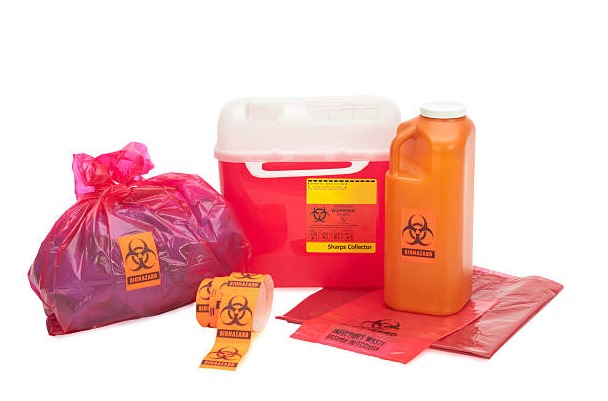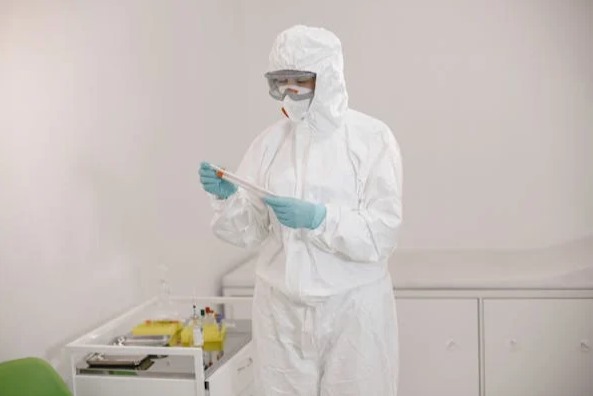It’s critical to comprehend what constitutes a biohazard before talking about biohazard cleanup. Biological compounds that endanger the health of living creatures, particularly humans, are referred to as biohazards by ScienceDirect.
Pathogens, viruses, and bacteria are examples of biohazards. Though they may be found in various contexts, they are typically found in establishments like hospitals and labs that deal with clinical and industrial waste.
Below are a few instances of biohazards:
- Medical waste, such as dirty bandages
- Blood as well as other body elements
- Biological components
- Animal excrement
- Sharps
- Medical syringes loaded with blood, biological waste spilled, and other material suited for the yellow biohazard bag
What is cleaning for biohazards?
The process of eliminating biohazard contaminants and making sure that impacted locations have received complete disinfection is known as biohazard cleaning. The primary objective of the Cleanup Agency for Biohazards Dallas is to make sure that there is no longer a risk to public health in the region.
Crime scene cleanup, trauma cleansing, and sharps disposal are a few typical biohazard cleaning services.
Cleaning procedure for biohazards
To guarantee that biohazard cleaning is completed properly and effectively, biohazard cleaners need to adhere to several guidelines.
To begin with, they have to evaluate the risks and make sure they have the right tools to get rid of any biohazards that could be there.
Industrial-grade cleaning agents and disinfection tools are utilized to eliminate biohazards and sanitize the impacted area after the risk assessment is finished. To lower the danger of exposure and infection, biohazard cleanup requires the use of the proper PPE (personal protective equipment).
Is cleaning for biohazards regulated?
Waste restrictions set out by the government regulate biohazards and clean-up programs.
Strict government guidelines must be followed by certified biohazard cleaners to guarantee that biohazardous wastes are disposed of securely and compliantly.

Why is the elimination of biohazards important?
Biohazardous compounds provide a significant risk to human health, such as body fluids like blood. People who are exposed to these materials run the risk of contracting serious illnesses including hepatitis B and HIV.
Biohazard removal should not be delayed as this might have lethal effects.
What Does Biohazard Cleaning Entail?
Biohazard cleanup is necessary in various settings, including crime scenes, trauma occurrences, infectious diseases, epidemics, and mishaps in the workplace. To stop the spread of illnesses and make polluted areas safe again, biohazard cleanup is essential.
Employer obligations for biohazard cleanup
It is legally required of employers to safeguard the health of both on-site visitors and staff members.
If used sharps are discovered on private land, for example, the owner of the property is accountable for organizing biohazard cleanup. According to legislation, it is the employer’s or the property owner’s primary duty to provide for an effective biohazard cleaning.
Employers are required to set up expert biohazard cleanup to reduce exposure danger and uphold a secure workplace. After a biohazardous event, you should get in touch with a cleaning service with competence in biohazard cleanup right away.
When might you need expert biohazard cleanup?
Facilities like hospitals and laboratories that handle clinical or industrial waste must regularly clean up biohazards.
Professional biohazard cleanup services are also required in the wake of distressing incidents involving potentially deadly germs. This covers fatalities from natural causes, auto accidents, suicides, and other traumatic incidents.
But keep in mind that there are a lot of different situations when biohazard removal could be necessary, for example, in the event of a severe disease epidemic or an accident involving body fluids at work.
Cleaning up biohazards and COVID-19
Expert biohazard cleanup has grown in popularity. particularly significant since the COVID-19 pandemic’s beginning. Viruses such as COVID-19 may endure on hard surfaces for as long as three days.
It is necessary to eradicate potentially harmful microorganisms to lower the risk of contact and infection.
When is training necessary for biohazard removal?
If your business handles biohazardous objects such as needles for injections or clinical waste, then biohazard cleanup training is necessary.
You may reduce the danger of infection and learn safe methods for gathering and discarding biohazard debris by enrolling in a biohazard cleanup course.
Biohazard Cleaning’s Risks
Exposure to Viral Diseases: Blood and body fluids can harbor dangerous illnesses such as HIV, hepatitis B, as well as hepatitis C, among others, which can infect cleaners.
Sharps-related injuries: Using objects like needles or other sharp objects can cause puncture wounds, which increase the risk of infection and contamination.
Chemical Hazards: Toxic chemicals and chemical pollutants can result in respiratory problems and chemical burns.
Emotional strain and psychological stress can result from working in stressful circumstances such as crime scenes (https://www.unodc.org/documents/human-trafficking/Toolkit-files/08-58296_tool_5-9.pdf) or accident scenes.
Physical Strain: Due to the rigorous nature of the task, there is an increased risk of physical strain and weariness.

